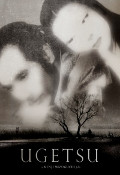
Japan 1953
Directed by
Kenji Mizoguchi
94 minutes
Rated PG
Reviewed by
Bernard Hemingway

Ugetsu
Part samurai-era drama, part ghost tale Ugetsu tells the story of two poor brothers, one Genjuro (Masayuki Mori), a talented potter, the other, Tobei (Eitaro Ozawa), a no-account with a groundless fantasies of being a samurai. Their region is scarred by clan wars and though dangerous times there is plenty of opportunity for business. Or at least Genjuro believes. He and Tobei head to market but both get waylaid, Genjuro by an aristocratic young woman who wants to buy his wares, Tobei by the sight of samurai troops.
Mizoguchi's film, one of the first Japanese films, along with Rashomon (1950), to attract international attention is beautifully composed most notably a scene on a mist-shrouded lake which serves to transition the story from its more realistic first part to the main section which tells the separate stories of the two brothers. Most of the attention goes to Genjuro and his seduction by the beautiful Lady Wakasa (Machiko Kyo, who played the female lead in Rashomon) which causes him to forget about the wife and child he left behind, with disastrous consequences. Tobei also forgets his wife, Ohama (Mitsuko Mito), until having by sheer luck got himself hired as samurai warrior he finds her working in a brothel where she ended up after being gang raped by soldiers.
Mizoguchi’s films are distinctive for their fluid, “scroll-like” camera movement and wide pans seen here in the establishing opening exterior and a scene in which Lady Wakasa batthes Genjuro in an onsen and the camera follows the splashing water over the edge of the pool and segues to them having a picnic in a open field .
Although as Westerners we may not fully appreciate Mizoguchi’s aesthetic particularly with respect to the Genjuro/Lady Wakasa middle section the theatrical conventions are apparent whilst overall the film’s stylishness holds the elliptical narrative in place with the production design giving an interesting portrayal of feudal era Japan.
Want something different?





